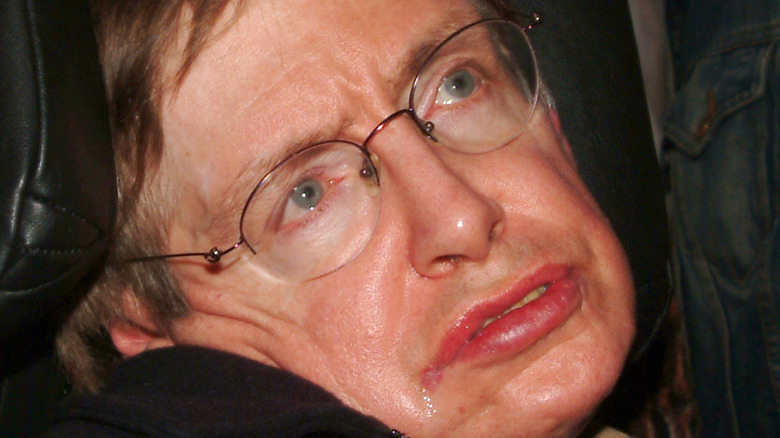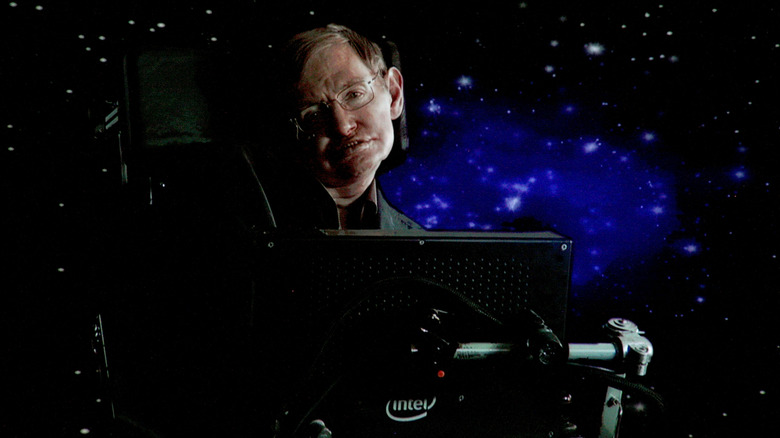Here's What Stephen Hawking's Net Worth Was When He Died
Brilliant theoretical physicist Stephen Hawking was born in January 8, 1942, the 300th anniversary of Galileo's death. He was the oldest of four children, born to well-educated parents — his father was a medical researcher and his mother (per the Daily Record) studied economics, politics, and philosophy at Oxford — who didn't have much money. Add to that the fact that it was wartime and a particularly gloomy time for everybody, and you can see a picture emerging: the Hawking family wasn't rich (via Scientific American). According to Biography, the Hawking family drove an old London taxi and lived in a home that needed work.
Hawking first noticed his health failing when he was studying at Oxford and was eventually diagnosed with ALS (Amyotrophic Lateral Sclerosis), sometimes referred to as Lou Gehrig's disease, a debilitating disease that affects a person's ability to eat, move and speak (per National Institute of Neurological Disorders and Stroke). Not that he let that stop him. Hawking, who originally wanted to study mathematics but had to "settle" for astronomy because Oxford didn't have a math department, went on to become one of the world's most famous physicists (via Space.com).
Hawking was catapulted to international fame in 1988 with the publication of his book "A Brief History of Time." It became an international bestseller with millions of copies sold and earned Hawking around $6 million (via Vanity Fair). Other books and prizes followed.
Hawking's earnings came from many different sources
Hawking was diagnosed with ALS when he was only 21 and a student at Cambridge. While the disease is extremely debilitating, Hawking continued his studies and went on to do some of the most groundbreaking work in cosmology and physics (per Biography). But amassing a fortune took some time. According to Vanity Fair, he only earned £19,000 ($25,000) while working as a university fellow in the 1980s. It wasn't until the publication of his book "A Brief History of Time" in 1988 that Hawking's finances really took a turn. The book became a worldwide bestseller, selling over 10 million copies and earning him millions.
The numbers differ from source to source, with estimates going from £2 million to £4 million for the sales of this title alone, Newsweek reports. He went on to write several other titles, including "A Briefer History of Time," a simplified version of his bestseller (supposed to already be a "simpler book for the masses"), which also sold very well, according to Biography. By this time, Newsweek reports, Hawking was also working at Cambridge University as a mathematics professor, where the usual annual salary for professors is around £140,000.
Hawking also made money in unexpected ways, such as promoting products (including a chain of eyeglass stores) on TV. According to a 2004 profile of Hawking in Vanity Fair, these earned him an additional $2 million, which also approximated his annual income at the time.
What happened to Hawking's money?
One of Hawking's last additions to his net worth was a $3 million prize he received in 2012 from Breakthrough Prizes, founded by Russian billionaire Yuri Milner (as reported via Newsweek). Hawking and Milner would team up again four years later for the ultimate space project: a $100 million star voyage of a featherweight spacecraft flying at 20% the speed of light (per The Guardian). He also continued to receive royalties for the movie about his life, "The Theory of Everything," and for making guest appearances in several TV shows, including a fun spot on "The Simpsons" (via the Law Offices of DuPont & Blumenstiel).
Hawking was married and divorced twice. The divorce settlements were not made public, but Wealth Advisor points out it's possible the divorces were a huge financial drain and could've easily had a major impact on his final net worth. There are also medical costs to consider — somebody with Hawking's medical issues could easily spend $200,000 a year out of pocket to stay alive. This too would have affected the net worth he left behind when he died.
Hawking died March 14, 2018, at the age of 76 (per Britannica). In the end, Hawking left his final net worth — about £16.3 million, or $20 million (per Celebrity Net Worth) — mostly to his three children (with his first wife) and three grandchildren in the form of a trust fund. He also left £10,000 to his personal assistant and funds to his favorite charities and the Stephen Hawkins Foundation (per DuPont & Blumenstiel).
His net worth continued to grow after his death
Some of Hawking's personal items sold for a significant amount of money after his death. While these weren't originally counted as part of his net worth, they certainly ended up adding to the financial contributions he left behind. Although Hawking left most of his fortune to his family, many items connected to his life were auctioned off after his death, with all proceeds being donated to the Stephen Hawking Foundation and the Motor Neurone Disease Association (per Esquire).
In November 2018, Reuters reported that Hawking's wheelchair from the mid-1980s through the early 1990s had sold for just under £300,000 (about $390,000) with the money going to charity. But that wasn't even the most expensive item to be auctioned. Hawking's university dissertation, which he wrote back in the 1960s, fetched an incredible £584,750 (almost $700,000), while his medals and awards sold for almost £300,000. According to the Law Offices of DuPont & Blumenstiel, Hawking had originally left his medals and academic awards to his children.
Another popular auction item? The script for the "Simpsons" episode in which Hawking actually rapped sold for $8,144, according to Esquire. At the end of the day, about $1.8 million was collected from the auction — all donated to charities Hawking supported throughout his life.



